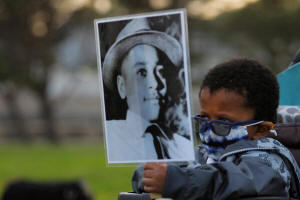Biden makes lynching a U.S. hate crime, signs Emmett Till law
 Send a link to a friend
Send a link to a friend
 [March 30, 2022]
By Nandita Bose and Jeff Mason [March 30, 2022]
By Nandita Bose and Jeff Mason
WASHINGTON (Reuters) -President Joe Biden
on Tuesday signed into law the first federal legislation to make
lynching a hate crime, addressing a history of racist killings in the
United States, after the Senate passed the bill earlier this month.
The law is named for Emmett Till, a 14-year-old Black boy who was
brutally murdered in Mississippi in 1955. The bill makes it possible to
prosecute as a lynching any conspiracy to commit a hate crime that
results in death or serious bodily injury.
Till's death, and an all-white jury's dismissal of charges against two
white men who later confessed to his killing, drew national attention to
the atrocities and violence that African Americans face in the United
States and became a civil rights rallying cry.
With the bill signing, the president was addressing both "unfinished
business" and "horror" in America's history, Vice President Kamala
Harris said from the White House Rose Garden after the bill signing.

Harris, the country's first Black and Asian American vice president,
co-sponsored the bill while serving as a U.S. senator from California.
"Lynching is not a relic of the past. Racial acts of terror still occur
in our nation. And when they do, we must all have the courage to name
them and hold the perpetrators to account,” she said.
[to top of second column]
|

Four-year-old Senty Banutu-Gomez holds a photograph of Emmett Till,
a 14-year-old Black boy who was lynched in 1955, at a vigil on the
one year anniversary of the murder of George Floyd while in
Minneapolis police custody, in Lynn, Massachusetts, U.S., May 25,
2021. REUTERS/Brian Snyder/File Photo
 In August, the FBI said the number
of hate crimes in the United States had risen the previous year to
the highest level in more than a decade, driven by a rise in
assaults against Black victims and victims of Asian descent.
Biden, whose support from Black voters helped propel him to the
presidency, said the law was not just about addressing crimes of the
past.
"It's about the present and our future as well," he said, mentioning
a rally of white nationalists in Virginia in 2017. "Racial hate
isn't an old problem. It's a persistent problem."
The bill passed the Senate by unanimous consent and the House of
Representatives by a vote of 422-3.
(Reporting by Nandita Bose and Jeff Mason in Washington; Editing by
Howard Goller and Heather Timmons)
[© 2022 Thomson Reuters. All rights
reserved.]
This material may not be published,
broadcast, rewritten or redistributed.
Thompson Reuters is solely responsible for this content. |